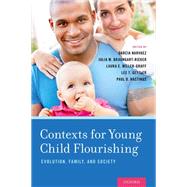Human beings have the most immature newborn and longest maturational schedule of any animal. Only 25% of the adult brain size is developed at full-term birth, and most of the brain's size and volume is co-constructed by caregivers in the first years of life. As a result, early life experience has long-term effects on physiological and psychological wellbeing.
Contexts for Young Child Flourishing uses an evolutionary systems framing to address the conditions and contexts for child development and thriving. Contributors focus on flourishing-optimizing individual (physiological, psychological, emotional) and communal (social, community) functioning. Converging events make this a key time to reconsider the needs of children and their optimal development in light of increasing understanding of human evolution, the early dynamism of development, and how these influence developmental trajectories. There is a great deal of misunderstanding both among researchers and the general public about what human beings need for optimal development. As a result, human nature unnecessarily can be misshaped by policies, practices, and beliefs that don't take into account evolved needs. Empirical studies today are better able to document and map the long-term effects of early deficits or early assets, mostly in animal models but also through longitudinal studies. An interdisciplinary set of scholars considers child flourishing in regards to issues of development, childhood experience, and wellbeing. Scholars from neuroscience, anthropology, and clinical and developmental studies examine the buffering effects of optimal caregiving practices and shed light on the need for new databases, new policies, and altered childcare practices.








